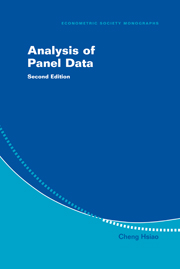Book contents
- Frontmatter
- Contents
- Preface to the Second Edition
- Preface to the First Edition
- Chapter 1 Introduction
- Chapter 2 Analysis of Covariance
- Chapter 3 Simple Regression with Variable Intercepts
- Chapter 4 Dynamic Models with Variable Intercepts
- Chapter 5 Simultaneous-Equations Models
- Chapter 6 Variable-Coefficient Models
- Chapter 7 Discrete Data
- Chapter 8 Truncated and Censored Data
- Chapter 9 Incomplete Panel Data
- Chapter 10 Miscellaneous Topics
- Chapter 11 A Summary View
- Notes
- References
- Author Index
- Subject Index
Chapter 9 - Incomplete Panel Data
Published online by Cambridge University Press: 14 May 2010
- Frontmatter
- Contents
- Preface to the Second Edition
- Preface to the First Edition
- Chapter 1 Introduction
- Chapter 2 Analysis of Covariance
- Chapter 3 Simple Regression with Variable Intercepts
- Chapter 4 Dynamic Models with Variable Intercepts
- Chapter 5 Simultaneous-Equations Models
- Chapter 6 Variable-Coefficient Models
- Chapter 7 Discrete Data
- Chapter 8 Truncated and Censored Data
- Chapter 9 Incomplete Panel Data
- Chapter 10 Miscellaneous Topics
- Chapter 11 A Summary View
- Notes
- References
- Author Index
- Subject Index
Summary
Thus far our discussions have been concentrated on situations in which the sample of N cross-sectional units over T time periods is sufficient to identify a behavioral model. In this chapter we turn to the issues of incomplete panel data. We first examine the problems of estimating dynamic models when the length of time series is shorter than the maximum order of the lagged variables included in the equation. We then discuss the issues when some individuals are dropped from the experiment or survey. We note that when individuals are followed over time, there is a high probability that this will occur. Since the situations where individuals are missing for a variety of behavioral reasons have been discussed in Chapter 8 in this chapter we only distinguish three situations: (1) individuals are missing randomly or are being rotated; (2) a series of independent cross sections are observed over time; (3) only a single set of cross-sectional data is available in conjunction with the aggregate time-series observations. We briefly sketch how statistical methods developed for analyzing complete panel data can be generalized to analyze incomplete panel data.
ESTIMATING DISTRIBUTED LAGS IN SHORT PANELS
Introduction
Because of technical, institutional, and psychological rigidities, often behavior is not adapted immediately to changes in the variables that condition it. In most cases this adaptation is progressive. The progressive nature of adaptations in behavior can be expressed in various ways.
- Type
- Chapter
- Information
- Analysis of Panel Data , pp. 268 - 290Publisher: Cambridge University PressPrint publication year: 2003
- 2
- Cited by



